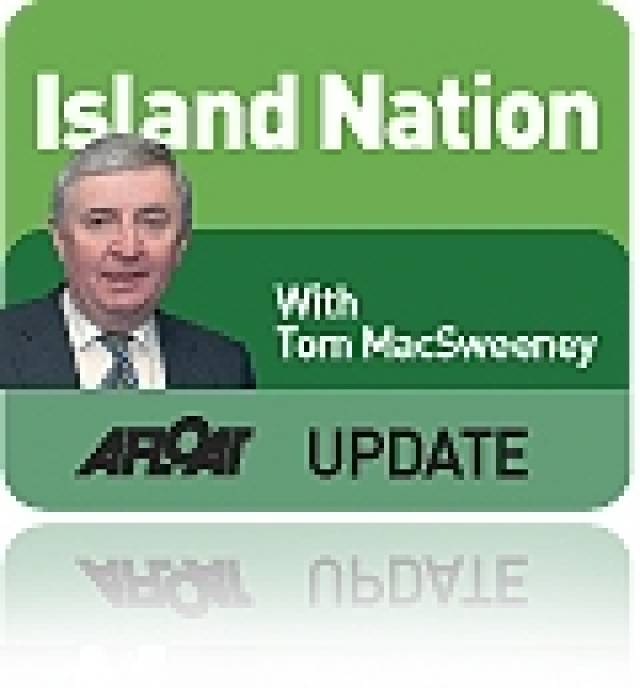#islandnation – The sea moulds the Irish coastline, it lubricates the nation's economy, its exploration is a resource for scientific investigation, it provides adventure and leisure.
The sea which surrounds us also has the potential to be a cradle for national resources, with the power to feed and provide energy.
A national strategy, "Harnessing Our Ocean Wealth," was launched in 2012, intended to position Ireland to gain advantages from the global marine market, particularly for seafood, tourism oil and gas, ocean energy, to a predicted value of €1.2 billion. The Naval Service has got a new ship, another is under construction. There is a National Maritime College and the Beaufort Centre of IMERC, the Irish Maritime and Energy Resource Cluster, on the College Campus will "promote Ireland as a world-renowned research and development location, that will unlock Ireland's maritime and energy potential," according to its own description. These are some of the positive developments.
So has the Government overcome the "sea blindness" which has pervaded national policy for many previous years?
Benjamin Franklin wrote of a "little neglect" creating greater problems and, though his remarks were aimed at other than maritime affairs, they are apposite to quote in relation to marine matters.
Why is it that an island nation does not have a dedicated maritime department of government and that aspects of the marine sphere are spread around so many departments that the high level which marine affairs should be at has been so diffused? This, despite pre-election promises by Coalition parties, that maritime affairs would have the highest priority and all of them would be brought under one Department.
That would seem to indicate that pre-election promises are just political guff by those who "say anything, comment on anything," to get into power and stay there!
Over 95 per cent of all exports and imports to this island are moved by sea and every import and export has to cross the sea, even the small percentage carried by air. Nothing can enter or exit the country without crossing over the sea.
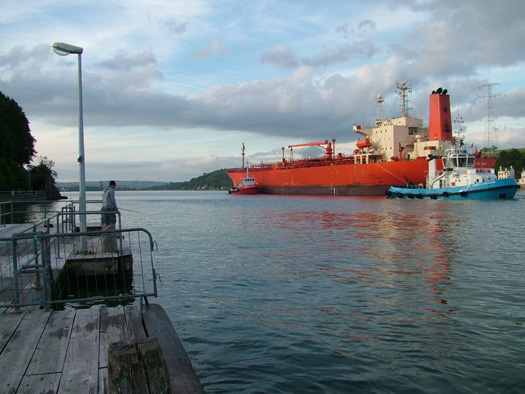
So why is the marine sphere not a primary focus of national policy?
The power to feed from the sea was given away by failures at the highest levels of political and civil service to realise how important the fishing industry should be to the future of the nation, when the vast wealth and resources of Ireland's waters in fishing were conceded to the power of the European Union.
Two natural gas finds, at Kinsale Head and the Corrib, have not and do not show signs of, producing wealth for the Irish people. From Kinsale, Ireland did get supplies of natural gas and a supply network, but the nation - the people of Ireland - paid for it while profits from the finds went to the exploration companies. The same looks like happening in the Corrib. The Government does appear to have changed its attitude, with new requirements announced for any future offshore discoveries of oil or gas, but it has come somewhat late to acceptance of the depth and breadth of Irish marine resources.
Raising public awareness about the maritime sphere in Ireland is crucial. This is relative to all aspects of the marine sphere from commercial, industrial, employment potential to leisure.
"Sea blindness" has pervaded political life for many years.
But it was not evident amongst early leaders of the nation. Arthur Griffith argued for a strong fishing industry and emphasised how vital it and the marine sphere would be to Ireland in the future. The Government during World War Two, realised the accuracy of that summation when, isolated despite being a neutral nation, it had to establish a national shipping company to supply vital needs. The liquidation of that company, the abandonment of seafarers, the disaster visited upon the fishing industry and coastal communities by the failures to realise its importance, neglect of ports and safety policy for many years were and in some cases remain as indicators of State neglect.
The fine weather has underlined the importance of the sea, as people went to the seaside; the problems of pollutants from landward into the sea and rivers has caused difficulties and perhaps given people some increased appreciation of the importance of the sea and protecting it.
Public awareness of the sea is crucial, to pressurise politicians, a group which, in the main, has failed to contribute positively in this regard. National media coverage of maritime affairs is abysmal, apart from tragedies and controversies.
There are Irish politicians who should be ashamed of themselves for their attitude to the marine sphere in past years. I cannot forget doing an interview with one of them, who came from a family with a long political heritage and who had just been appointed Minister for the Marine and who told me, as he thought in avuncular fashion and that it was a joke: "I'm the Minister for fish and ships, but we have to suffer a bit in political life to get on." When I asked if he would repeat that comment on the record, he got rather nasty and didn't like when I said that I respected seafarers and fishermen, but doubted his attitude, from what he had said about his department which seemed, to me like disrespect of the importance of maritime matters.
"Well, it's not the highest appointment I could have got," was the huffy reply.
I have attempted to make the case for an Irish Maritime Foundation, which would be founded to raise awareness of marine matters, encompassing all strands of interest, which would be a maritime platform, with public, private and State involvement.
Ireland's maritime resources, our maritime heritage, the island nation in which we live, deserve this.
There should be a dedicated Department of the Marine, encompassing all aspects of the marine sphere and the Minister of that Department should be regarded as a major posting in Government.
That would recognise that Ireland is "an island nation."
The public have a role as the guardians of Ireland's marine resources.
SAILING DECISIONS
I wrote a few weeks ago about my interview with David Lovegrove, President of the Irish Sailing Association and the review of sailing and if the association which he is leading. He impressed me with his fresh, innovative thinking and determination. Sailing also needs higher public awareness.
I was in Carrigaline Library in County Cork when a man approached and told me how he very much wanted his son to go on an ISA Training Course, but he could not afford the club membership which would be necessary before his son wold be accepted and that, coupled with the cost of the course itself and, perhaps, a boat to use, it was all beyond his resources. His young lad, of 11, was with him. He had been at a football summer camp, which cost €80.00 and his father wondered why sailing clubs did not provide something similar and not just the courses which he considered expensive.
I did explain about courses at sailing schools and about the costs which clubs had to meet to run courses, but his experience does make a point. Is there any prospect of a 'summer camp" approach without high costs, for those who would like to be involved, but can't afford formal training courses in these present times?
A related point is for those who would like to crew on boats, but cannot afford club memberships and probably would not use a club facilities for other than on one night's racing a week.
These are aspects which could be looked at to address declining numbers.
As this man said to me: "You say that sailing is a sport for all, but I don't see that."
Affordability is an issue because other sports are cheaper to become involved in.
I hope that this will be addressed when the result of David Lovegrove's work is revealed later this summer. I gather that also discussed by the ISA board have been how sailing can be given a 'community involvement' aspect, preserving the 'lifelong sport' approach which, in my view, should be a major attractive point and sailing's unique capacity for family involvement; how to relate cruising and racing, the fragmentation of the sport into so many classes of boats; and how to relate club and local sailing with high performance.
There are a lot of issues, another of which of course is the media attitude towards the sport. It remains noticeable how little regular, concentrated attention, it is given by the national media.
FIRST WORLD ANGLING MEDAL FOR IRELAND
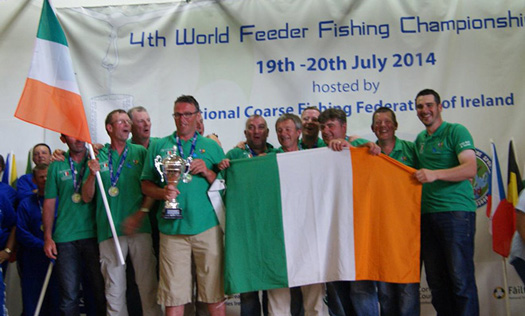
It is good to see another Irish marine success, a historic achievement for Irish coarse anglers. 125 anglers from 25 countries were in Coachford, County Cork, for the World Feeder Fishing Championships. Going into the competition the English team was the favourite. They had visited the venue a number of times in advance of the competition as part of their preparations! "The Irish finish was especially satisfying," Paul Bourke of Inland Fisheries Ireland told me, "as it is the first team medal in a world championships." Congratulations go to Francis McGoldrick, Richard Pratt, Tony Kersley, Paul Leese, Nigel Houldsworth, Ken Ince, Brenton Sweeney– Captain and Roger Baker– 2nd Captain.
DIVING TRAGEDIES
Though I am more involved in being "on the water" rather than in it and prefer things that way, I appreciate the under-the-surface beauty of Irish waters and the sport of diving, amongst the fraternity of which I have many contacts. The deaths of six recreational underwater divers since June have been of deep concern. It is not an emerging trend of fatalities in the sport, according to the Irish Underwater Council which has urged diving enthusiasts to ensure that they are medically fit to dive and that their equipment is serviced at regular times and is in good working condition.
MARVELLING AT THE OPPIES
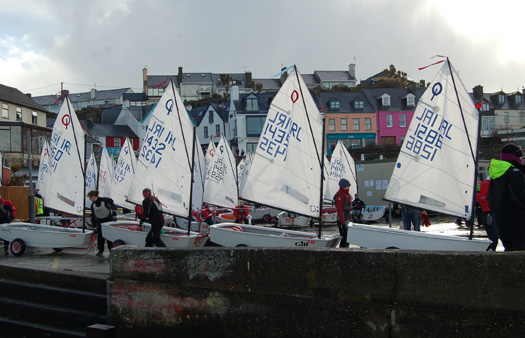
I remember one night at the RCYC when there was a discussion about whether it was a night to go sailing as the rain fell and it seemed the wind would be increasing.
I looked out from the clubhouse and there was the Optimist fleet, with the young sailors putting out for their racing/training. That ended the discussion and off we went! There are times when I look with appreciation and some awe at what conditions the Oppies can handle. Sometimes I wonder if they are being exposed to too much, as I did in the cold and wet at Baltimore in West Cork earlier this year in what seemed like mid-Winter days when there were Oppies from, it seemed, all over the country for a training session. But the Oppies seem to manage it all.
There is just over a week to go until the closing date for entry to the Optimist National Championships at the RCYC. Doug Howlett will officially open the CH Marine-sponsored event which will start on Thursday, August 14. Details on www.oppienationals.com or by emailing [email protected]
GREENPEACE FOLLOWING COSTA
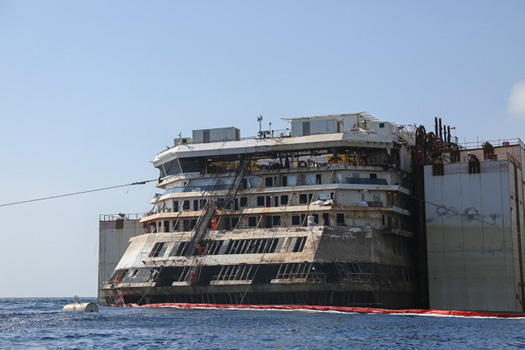
Greenpeace has been following the towing of the Costa Concordia from Giglio to Genoa, because of its passage through what it has described as "one of Europe's largest marine sanctuaries."
"We're particularly concerned about impacts on the Pelagos sanctuary, which protects whales and other marine life in the area," said Greenpeace.
The Pelagos Sanctuary for Mediterranean Marine Mammals is a protected area of 87,500 square kilometres in the north-western Mediterranean covering much of the towage course. The decision to tow the Costa Concordia to Genoa was approved by the Italian Government prior to the start of the re-floating operation and was based on that port's ability to perform the demolition work.
NEXT THIS ISLAND NATION RADIO PROGRAMME HERE ON AFLOAT: August 7.


























